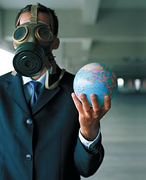 |
 |
|
|
Health Articles:
Alternative and General Health
Musculoskeletal Health
Nutrition and Herbs
Pediatric Health
Senior Health
Sports & Fitness
Women's Health
Ask A Doctor (Forum)
|
By Ronald E. Partain Sr. On a daily basis, your body comes in contact with harmful toxins that can cause numerous health challenges and a decreased quality of life. Heavy metals are in our environment and nothing can be done to change that. We can limit the amount of new heavy-metal toxins entering our planet (although we haven't done anything about it yet), but the levels that already exist cannot be removed. And when heavy-metal toxins are in the environment, they are in your bodies, with a potentially devastating impact on your health. They're in your food, in your water, your air, your place of work and in your home - you cannot escape them! Lead, mercury, aluminum, cadmium, arsenic, and nickel are in your food, water and air, which means they also are in your body. The Culprits There are 35 metals that concern us because of occupational or residential exposure; 23 of these are the heavy elements or "heavy metals" and include antimony, arsenic, bismuth, cadmium, cerium, chromium, cobalt, copper, gallium, gold, iron, lead, manganese, mercury, nickel, platinum, silver, tellurium, thallium, tin, uranium, vanadium and zinc. Interestingly, small amounts of these elements are common in our environment and diet, and actually are necessary for good health; but large amounts of any of them may cause acute or chronic toxicity (poisoning).
For some heavy metals, toxic levels can be just above the background concentrations found in nature. Therefore, it's important for us to inform ourselves about the heavy metals and to take protective measures against excessive exposure. In most parts of the United States, heavy-metal toxicity is an uncommon medical condition; however, it's a clinically significant condition when it does occur. If unrecognized or inappropriately treated, toxicity can result in significant illness and reduced quality of life. If you suspect you or someone in your household might have heavy-metal toxicity, testing is absolutely essential. |
